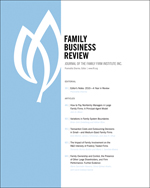‘Should My Spouse Be My Partner?’
On the matter of working together with one’s spouse in a business environment, views are conflicted. On the one hand, can it be a utopia—working together, living together, sharing the same goals—or does it simply create too much conflict and too many problems for the business?
In a new Family Business Review podcast, Dr. Gibb Dyer of Brigham Young University seeks to answer this question with findings from his paper, “Should My Spouse Be My  Partner? Preliminary Evidence From the Panel Study of Income Dynamics,” co-authored by W. Justin Dyer of Brigham Young University and Richard G. Gardner of Texas A&M University and published in the FBR March 2013 issue.
Partner? Preliminary Evidence From the Panel Study of Income Dynamics,” co-authored by W. Justin Dyer of Brigham Young University and Richard G. Gardner of Texas A&M University and published in the FBR March 2013 issue.
Click here to play or download the podcast interview, or subscribe on iTunes by following this link.
 W. Gibb Dyer (Ph.D MIT) is the O. Leslie Stone Professor of Entrepreneurship and the Academic Director of the Ballard Center for Economic Self-Reliance. Dr. Dyer is a recognized authority on family business and entrepreneurship and has been quoted in publications such as Fortune, The Wall Street Journal, The New York Times, and Nation’s Business. In 2007 he was given the faculty teaching award from Brigham Young University’s division of continuing education, and in 2008 was given the outstanding faculty award from the Marriott School at BYU. He was recently ranked one of the top 10 researchers in the world in the field of family business. He has published over 45 articles and 7 books that have been cited over 4000 times.
W. Gibb Dyer (Ph.D MIT) is the O. Leslie Stone Professor of Entrepreneurship and the Academic Director of the Ballard Center for Economic Self-Reliance. Dr. Dyer is a recognized authority on family business and entrepreneurship and has been quoted in publications such as Fortune, The Wall Street Journal, The New York Times, and Nation’s Business. In 2007 he was given the faculty teaching award from Brigham Young University’s division of continuing education, and in 2008 was given the outstanding faculty award from the Marriott School at BYU. He was recently ranked one of the top 10 researchers in the world in the field of family business. He has published over 45 articles and 7 books that have been cited over 4000 times.
 Karen L. Vinton, Ph.D., is a 1999 Barbara Hollander Award winner and Professor Emeritus of Business at the College of Business at Montana State University, where she founded the University’s Family Business Program. An FFI Fellow, she has served on its Board of Directors and chaired the Body of Knowledge committee. From 1997 through 2011, Vinton served on the editorial board of the Family Business Review, and is the current assistant editor. Before retiring, Vinton served as director for her own family’s business (negotiating its eventual sale)and had her own family business consulting practice, Vinton Consulting Services. Karen can be reached at klvinton700@gmail.com.
Karen L. Vinton, Ph.D., is a 1999 Barbara Hollander Award winner and Professor Emeritus of Business at the College of Business at Montana State University, where she founded the University’s Family Business Program. An FFI Fellow, she has served on its Board of Directors and chaired the Body of Knowledge committee. From 1997 through 2011, Vinton served on the editorial board of the Family Business Review, and is the current assistant editor. Before retiring, Vinton served as director for her own family’s business (negotiating its eventual sale)and had her own family business consulting practice, Vinton Consulting Services. Karen can be reached at klvinton700@gmail.com.
































































































